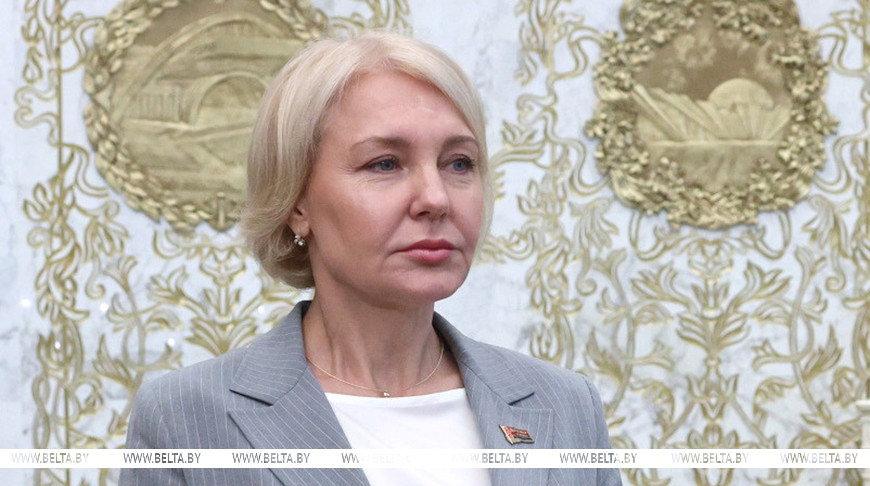
Olga Chupris. An archive photo
In July 2024 Belarus President Aleksandr Lukashenko instructed the Belarus President Administration to organize a large-scale revision of the legislation. The president remarked that about 175,000 regulatory documents are in effect in Belarus at present. Some of them are hard to read and comprehend. Some are overloaded and individual matters are overly regulated. The head of state described the state of affairs as a catastrophe and gave instructions to prune everything superfluous. “It will be a revolution of not only lawmaking activities. It will be a revolution in the country,” Aleksandr Lukashenko said to evaluate the scale of the task.
Deputy Head of the Belarus President Administration Olga Chupris organized this work. In order to carry out a truly massive revision of the legislation, nine expert groups were set up. They interacted with domain-specific ministries. Government agencies, members of the parliament, judges, scientists, education institutions, independent lawyers and notaries as well as ordinary citizens joined in the process. As a result the Belarus President Administration received about 1,500 proposals. Lawyers describe the revision as titanic work. Olga Chupris went on air of the First News TV channel to explain details and results of the work.
How many regulatory acts are passed in Belarus every year?
Olga Chupris remarked that over the years of independence Belarus went through explosive development in all spheres and accumulated a significant body of law. In her words, every year the government passes about 900 legal acts while government agencies pass about 1,500 legal acts. Certainly, such a large amount of legislation generates a number of complications, too.
“There are shortcomings, lack of coordination, contradictions, and too much regulation. The head of state has repeatedly drawn attention to it and criticized executive authorities with a good reason. Rather serious systemic measures had to be implemented. This is why in the Year of Quality the head of state decided it was necessary to perform a global analysis of the legislation,” Olga Chupris said.
She remarked that the quality of life in the country is also determined by quality legislation, its logic and systemic nature, and the convenience of applying it.
What did the legislation revision unearth?
How did the work begin? If we open the national registry of legal acts, we will find over 170,000 documents. A third of them will be resolutions of the government and central government bodies (a total of about 55,000). It was decided to begin the revision with analyzing these legal acts.
“About 15,000 documents resulting from 27 codices, 221 laws, and 55 ordinances and decrees of the head of state were analyzed in detail,” said the deputy head of the Belarus President Administration.
In her words, about 8,000 rather serious shortcomings were identified as a result. For instance, about 1,000 legal acts have expired in practice. About 2,300 documents are of technical nature and could not have the status of a regulatory act. For instance, those were academic programs in the education system.
Nearly half a thousand documents needed updating. In other words, they had to be brought into compliance with the effective legislation. It turned out that some regulatory acts were passed in conflict with competences.
“About 570 acts regulate similar legal relations. Which means there are options for reworking them. Some of them can be merged with each other. Approximately 400 acts do not conform to each other. Over 200 acts are often adjusted and parallel norms of other regulatory acts. As a rule, those are acts of the government. The government system had acts, which are adjusted about 100 times per year,” Olga Chupris quoted a series of figures.
The commission also detected documents in excess of 100 pages. Individual regulatory acts were close to 1,000 pages. “I mean they are not only hard to implement. They are even hard to read. When we tried to export them from the legislation database, the computer froze,” the deputy head of the Belarus President Administration noted.
The commission’s conclusions
Most of the drawbacks were found in the social sphere. Education, healthcare, and culture top the chart. They are followed by transportation. And these are the spheres that are closest to the population. Defense, security, and law enforcement agencies had the lowest number of shortcomings.
To compare, every ministry passes about 50 acts every year on the average. However, the numbers vary by a lot from agency to agency: from five documents in the State Border Committee of Belarus to 308 documents in the Education Ministry. The Healthcare Ministry and the Culture Ministry pass about 100 acts per annum each.
Where does such a large number of documents come from? The commission concluded that the social sphere contains a large number of so-called technical documents, which stipulate, for instance, education or treatment guidelines.
“It is also interesting that, one can say due to objective reasons, the ministries that release a large number of acts with numerical values stand out from the crowd. For instance, the Antimonopoly Regulation and Trade Ministry is way ahead of the rest. As much as 40% of the ministry’s acts are acts dealing with pricing matters. The Economy Ministry has approximately as many acts. There is a large number of regulatory acts in the Sports and Tourism Ministry and the Agriculture and Food Ministry. They stipulate prices, tariffs, and other figures. They clutter up our body of law. But since we say that they are regulatory acts, then they have to be passed according to a complicated procedure. Just like technical acts. And one wonders why these acts should go through complicated adoption procedures,” Olga Chupris noted.
In her words, it was decided to pass a single registry of digital indicators and simplify the process of adopting such acts as a whole. “Our technical database of regulatory acts will have a digital registry that users will be able to access and look up various digital indicators,” the deputy head of the Belarus President Administration explained.
As it was revising the legislation, the commission made another unexpected discovery. It turned out that some ministries abuse their competences. The number of violations is small but the fact that they exist is a reason for alarm and a serious violation.
“For instance, the Healthcare Ministry abuses the right to pass regulatory acts and contrary to the president’s Entrepreneurship Development Ordinance the ministry passes acts on sanitary norms, which are supposed to be passed by the Council of Ministers,” Olga Chupris said.
How many regulatory acts were passed in the BSSR? Why is the number so large today?
By the way, during the Soviet era the government of the Byelorussian Soviet Socialist Republic (BSSR) passed about 300 acts per annum or three times less than today. Government agencies did not pass many acts either. However, it should be noted that there was no requirement to publish such documents back then.
“Modern excessive lawmaking is due to the fact that our laws provide rather large opportunities for publishing bylaws. In other words, we add reference rules to them. The Education Code is a case in point. It contains 90 reference rules that allow the government to pass acts in furtherance of the code and 260 reference rules that allow government agencies (primarily the Education Ministry) to pass acts in furtherance of the Education Code. As part of the realization of this code we have about 1,000 departmental acts and about 7,000 technical regulatory acts,” Olga Chupris quoted several interesting figures.
The revision is over. What now?
The work to revise the legislation has been completed but what happens next? According to Olga Chupris, all the materials have been forwarded to the government. A resolution has already been prepared to invalidate about 1,500 regulatory acts. The Belarus President Administration believes it is already a good result.
Certainly, the work will not stop at that. The president has given instructions to perform such revisions on a regular basis. The head of state has backed a complex of measures to debureaucratize the creation of regulatory acts, to improve the quality of regulatory acts, and improve the legal significance of the Justice Ministry and all the legal services.
“Another important decision. In order to realize the complex of assigned tasks, which is measured in several pages of tasks, it will be necessary to amend the law on regulatory acts and a number of other regulatory acts that also regulate the abovementioned matters. Those are primarily presidential decrees,” Olga Chupris said.
Databases will also be affected. It is necessary to make them convenient for users.
Possible contribution of artificial intelligence
“And finally we live in a digital society, which is intent on using artificial intelligence. This is why the president backed the idea that the computerized system on lawmaking, which is being developed now and will be deployed this year, should leverage artificial intelligence as well. The National Center of Legislation and Legal Information (NCLLI) will have to carry out this task,” the deputy head of the Belarus President Administration stressed.
In her words, AI can help systematize documents. During the development of a new regulatory act AI can determine whether the new document contains duplicate clauses that have been already implemented by the legislation.
“It can help answer the question of whether we need to pass a regulatory act as it is because many issues have already been addressed,” Olga Chupris added. “This is why we need to devise algorithms and questions that we will ask the artificial intelligence. With its help we will simplify our lawmaking process and improve the quality of our regulatory acts.”
Will citizens feel the effect of the legislation revision?
Yes, truly massive work has been completed. But will ordinary citizens feel the effect? Olga Chupris is convinced that quality lawmaking and quality legislation benefit everyone.
“If we have simple and convenient legal solutions in the education system and the healthcare system, it will benefit not only teachers and medics. It will benefit parents and children as well. Or if we simplify the technical process of making regulatory acts, then the parties that are involved in this process will benefit from it. Those are all the government agencies, all the civil servants,” the official pointed out. “As part of the implementation of the head of state’s instruction the Council of Ministers gave an instruction to deregulate the sphere of economy as part of its system. It is a very important task. We hope they will accomplish it.”
The revision also found out that some aspects of the social sphere require regulation. For instance, matters concerning residential lease and additional protection of rights of the underage, including their shares in apartments built with state support. The Belarus President Administration stated that these matters will also be addressed soon.
“The head of state encourages us to invariably evaluate the public opinion and take it into account during the development of regulatory acts that affect rights and freedoms of citizens. This is why the discussion about the Healthcare Code has been extended till 1 February. Citizens demonstrated special interest in this document,” Olga Chupris noted.













